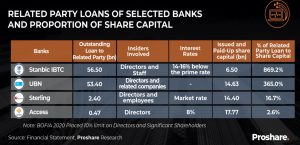Stanbic IBTC, Union Bank, and Sterling Bank have been identified as three Nigerian financial institutions that led in the violation of the BAFIA ACT 2020 in relation to insider loans in 2022.
This is according to a published report by Proshare’s analysts.
Banking regulations impose constraints on the lending exposure of banks to their directors and substantial shareholders.
However, the trio of financial institutions have been found taking advantage of the fact that the regulation does not cover other related parties, such as associates and employees of the banks to abuse the system.

Data obtained by www.theoctopusnews.com from the report of research by Proshare Analysts revealed that directors and associates of four Nigerian banks, including Stanbic IBTC, Union Bank of Nigeria, Access Bank, and Sterling Bank, were granted humongous loans amounting to N112.77bn in 2022.
An analysis of the Audited Financial Statements (AFS) of the highlighted banks revealed that Stanbic IBTC Holdings extended loans of N56.5bn to its directors and staff, Union Bank of Nigeria disbursed N53.40bn to its directors and affiliated entities, while Sterling Bank provided N2.4bn in loans to its directors and employees in 2022.
On its part, Access Bank allotted N1.35bn to its directors and key management personnel with director-related exposure amounting to N469m, while its ratio of directors’ loans to share capital stood at 2.6 per cent of share capital, which is in line with regulatory provisions.
Section 19 (5) of the BOFIA Act 2020 prohibits banks from lending more than 5 per cent of their paid-up capital to any of their directors or significant shareholders
Also, the Act states that the collective exposure of banks to all directors and significant shareholders is capped at 10 per cent of banks’ paid-up share capital or an alternate percentage as stipulated by the Central Bank of Nigeria (CBN).
“Breaking down the loans into categories of directors-related and other employees-related revealed that the proportion of loans attributed to directors fell below 10 per cent of paid-up share capital. Although most of the banks provided no detail on specific directors’ loans, evidence suggests that these loans were provided at interest rates below prevailing market rates. For instance, Stanbic IBTC offered the loan at a concessional rate ranging between 14-16 per cent below the prime rate,” part of the report by Proshare’s Analysts read.
This practice by Stanbic IBTC, Sterling Bank, and Union Bank of Nigeria bridges the provisions of Section 19 (5b) of the BOFIA Act, which mandates that banks ensure loans to directors or significant shareholders are established at par with prevailing market terms for similar transactions and do not entail excessive risk in terms of repayment.
The above summation shows flagrant abuse of regulations of operation by Stanbic IBTC, Sterling Bank, and Union Bank, thus unsettling the financial sector, and putting depositors at risk of losing their funds in deposit banks, especially when the loans are not repaid.

The analysis by Proshare’s analysts further emphasizes that attention should be directed towards prudential guidelines that have sterilized a significant proportion of banks’ funds, while simultaneously mandating a 65 per cent loan-to-deposit ratio.
“The pursuit of meeting credit creation limits has the potential to raise banks’ non-performing loans, amplifying the systemic risk,” the report noted.
Post Views: 3,570